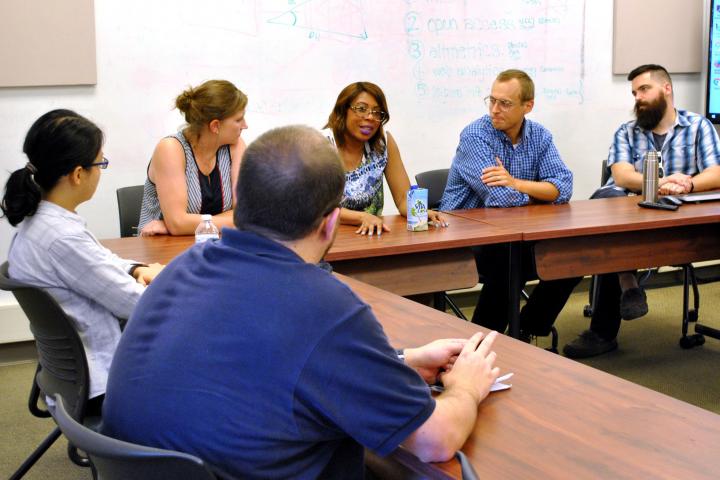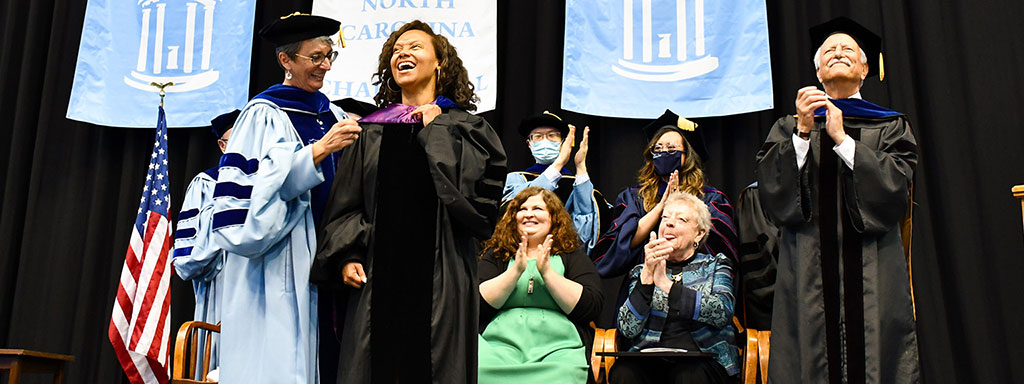Ph.D. in Information and Library Science
This doctoral program provides an environment that enables creative and energetic students to become innovative thinkers and leaders. Through coordination of student and faculty interests and activities, the program offers opportunities for research, teaching, and leadership in a variety of settings.
Information and library science research leaders must be able to identify problems that are significant for our future as an information society, carry out rigorous studies and draw valid conclusions from them, and communicate those findings to stakeholders who can act on them. The SILS doctoral program provides intensive, but highly flexible and customizable, preparation for careers in academia and research.
The Ph.D. in Information and Library Science is designated as a STEM program, which allows eligible international graduates to apply for a 24-month OPT extension.
After successfully defending their dissertations, SILS’ graduates have accepted positions as tenure-track faculty in information schools, research scientists in corporate and government labs, and chief information officers in a myriad of organizations and businesses. With a degree from our doctoral program, our graduates are making a difference.
- Kimberly Hirsh, 2021, Consulting Scholar-Librarian
- Sandeep Avula, 2020, Research Scientist, Amazon
- Eliot Hauser, 2020, Assistant Professor, University of Texas at Austin
- Colin Post, 2020, Assistant Professor, University of North Carolina at Greensboro
- Jonathan Crabtree, 2020, Assistant Director of Research Data Information Systems, Odum Institute, UNC-CH
- Emily Roscoe, 2020, Adjunct Instructor, School of Government, UNC-CH
- Megan Threats, 2020, Assistant Professor, Rutgers University
- Heather Barnes, 2020, Digital Curation Librarian, Wake Forest University
- Yinglong Zhang, 2020, Research Scientist, Google
- Shenmeng Xu, 2020, Scholarly Communications Librarian, Vanderbilt University
- Sarah Beth Nelson, 2019, Assistant Professor, University of Wisconsin, Whitewater
- Anita Crescenzi, 2019, Assistant Professor, School of Pharmacy, UNC-CH
- Kathleen Brennan, 2018, Senior Researcher, Google
- Samantha Kaplan, 2018, Research and Education Librarian, Duke University
- Ericka Patillo, 2018, Clinical Assistant Professor, School of Information Studies, University of Tennessee, Knoxville
- Grace Shin, 2018, Sookmyung Women’s University, Korea, Adjunct Professor at SILS.
- Leslie Thomson, 2018, Postdoctoral Fellow, UNC-CH
Other notable graduates in recent years:
- Jay Dominick, 2005, Vice President and CIO at Princeton University
- Meredith Evans, Ph.D. 2006, Director, Jimmy Carter Presidential Library and Museum & 74th President of the Society of American Archivists
- Meredith Weiss, 2010, Vice President for Administration at Virginia Commonwealth University
- Fred Stutzman, 2011, CEO, Freedom
Financial Support
SILS typically provides support for full-time doctoral students during their first five years of study. Prospective doctoral students must apply by December 10 to receive full consideration for financial aid.
Learn more from our Financial Information page.
SILS seeks PhD students who:
- Aim to be information leaders in the 21st century.
- Are attracted to information and library science as a field that incorporates diverse theoretical perspectives and a wide range of research methods.
- Possess the discipline and will to be independent investigators, and the vision and communication skills to be influential leaders in the field.
- Are committed to a life of research and scholarly inquiry addressing critical questions.
- Enjoy intellectual challenges and demonstrate analytical and critical thinking.

Admissions
Admission to the doctoral program is competitive and based upon the strength of the applicant’s educational background and standardized test scores, work experience, statement of research, and personal interview. In reviewing applicants for admission, the school will consider past academic record and scholarly potential of an applicant, as well as the match of the candidate’s research interests with those of the school’s faculty. One or more faculty must be willing to assume the advisory role for the student.
ADMISSION INFORMATION
Questions?
 Contact Eleni Papadoyannis
Contact Eleni Papadoyannis
Doctoral and Special Programs Coordinator
epapa@unc.edu or 919-962-0182

